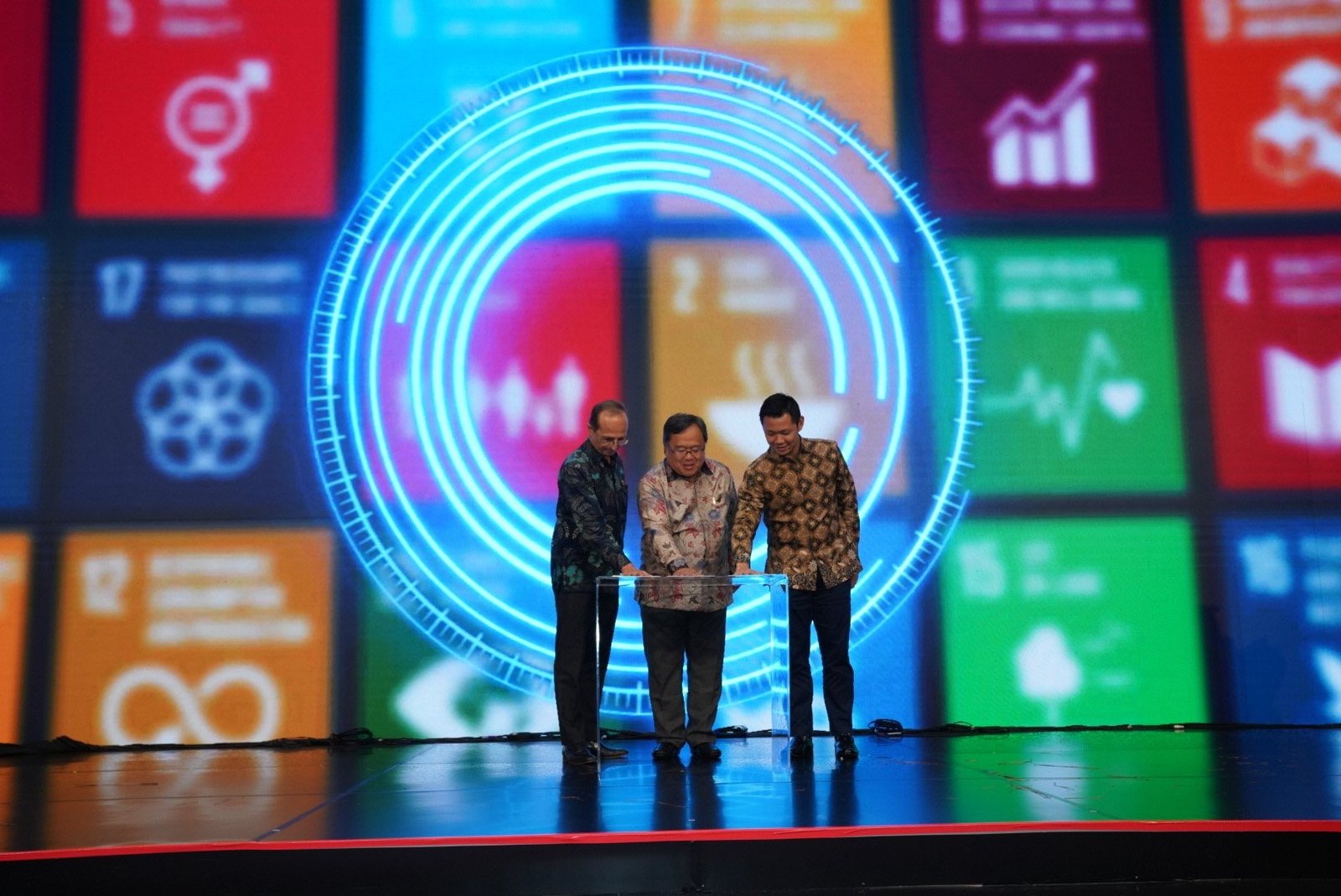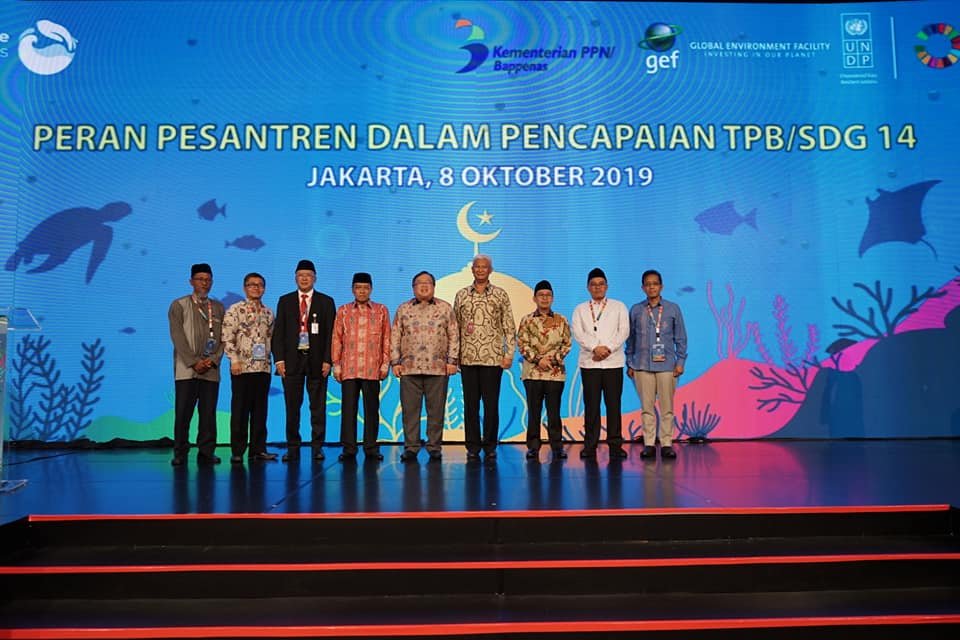 United Nations Development Programme (UNDP) and Ministry of National Development Planning/BAPPENAS host a plenary on Tuesday 8 October 2019, in Jakarta, to discuss the roles of Pesantren (Muslim boarding school in Indonesia) in supporting achievement of SDG14: Life Below Water.
United Nations Development Programme (UNDP) and Ministry of National Development Planning/BAPPENAS host a plenary on Tuesday 8 October 2019, in Jakarta, to discuss the roles of Pesantren (Muslim boarding school in Indonesia) in supporting achievement of SDG14: Life Below Water.
This plenary is part of the lndonesia SDGs Summit 2019, 8-9 October 2019, which this year focus on marine conservation to improve welfare and reduce inequality. The plenary is opened by Minister Bambang PS Brodjonegoro of BAPPENAS, and Chair of Nadhlatul Ulama KH. Said Aqil Siroj. The panel discussion is consisting of Deputy Minister for Maritime and Natural Resources of BAPPENAS, Director of Early Education and Islamic School of Ministry of Religious Affairs, chair of RMI-NU, coastal pesantren “Tarbiyatut Tholabah” Lamongan, and moderated by Luky Adrianto, Dean of Faculty of Fisheries and Marine Science of IPB University. Participants are representative from related ministries and agencies and about 100 pesantren from coastal area of DKI Jakarta, Banten and West Java.
There are more than 25 thousand pesantren in Indonesia, including many are in the coastal regions where community dependency to marine and coastal resource are high. As there are strong socio-economic and cultural ties between pesantren with nearby/surrounded communities, pesantren can play strategic roles as an agent of transformation, with its own uniqueness, to improve capacity of human resources, contribute to economic development in coastal regions, as well as proactively involve in promoting good governance and sustainable management of marine and fisheries resources.
 This plenary is closely related to the principle of Sustainable Development Goals (SDGs) which is “no one left behind” which is empower and involve everyone to progressively achieve the SDGs. The SDG Goal-14: Life Below Water consists of three main aspects that are compatible to each other: healthy fisheries which related to sustainable use and production of fisheries, healthy and productive marine ecosystem which related to protection and conservation of ecosystem, and wealthy fisheries which related to improvement of economic wellbeing especially coastal communities such as fishers. This is relevant for Indonesia who continues to actively optimize its national fisheries production. With its complexity, Indonesia fisheries sector needs an integrated management system that considers the integration of upstream to downstream industries, environmental and social economic aspect, and inclusive management which involve all stakeholders. One of key aspect to achieve the target of sustainable fisheries in Indonesia is by effectively implement the regional fisheries management (Wilayah Pengelolaan Perikanan) approach that consider uniqueness, strength, and diversity of marine and fisheries in Indonesia.
This plenary is closely related to the principle of Sustainable Development Goals (SDGs) which is “no one left behind” which is empower and involve everyone to progressively achieve the SDGs. The SDG Goal-14: Life Below Water consists of three main aspects that are compatible to each other: healthy fisheries which related to sustainable use and production of fisheries, healthy and productive marine ecosystem which related to protection and conservation of ecosystem, and wealthy fisheries which related to improvement of economic wellbeing especially coastal communities such as fishers. This is relevant for Indonesia who continues to actively optimize its national fisheries production. With its complexity, Indonesia fisheries sector needs an integrated management system that considers the integration of upstream to downstream industries, environmental and social economic aspect, and inclusive management which involve all stakeholders. One of key aspect to achieve the target of sustainable fisheries in Indonesia is by effectively implement the regional fisheries management (Wilayah Pengelolaan Perikanan) approach that consider uniqueness, strength, and diversity of marine and fisheries in Indonesia.
This plenary is part of the Multistakeholder Platform for Sustainable Fisheries that is launched in 25 July 2019 by Bappenas to provide a collaborative space for stakeholder to support the country efforts towards sustainable fisheries under the umbrella of SDG-14 Working Group. The platform is established through the Global Sustainable Supply Chains for Marine Commodities (GMC project) (2018-2021) implemented by BAPPENAS with technical support from UNDP financed by Global Environment Facility (GEF). The project aims to contribute to the transformation of the seafood market by mainstreaming sustainability in the value chain of important marine commodities.
Contact:
Roby Fadillah
Deputy Director of Institunalisation, Development of Marine Product, and Maritime Affairs
Ministry of National Development Planning/BAPPENAS
roby.fadillah@bappenas.go.id
Jensi Sartin
National Project Coordinator, Global Marine Commodities – UNDP Indonesia,
jensi.sartin@undp.org